#bbc past doctor adventures
Text
Not being familiar with Cromwell's nickname - all I learned about the English Civil War growing up came entirely from Horrible Histories and, at university, every lecture on Thomas Hobbes - it has taken me until now to realise that the christening of the Daleks as Ironsides in Victory of the Daleks is probably yet another manifestation of Mark Gatiss' obsession with the history of that period.
Cute, honestly, and probably the best thing about that episode.
(Also 400th post alert wahoo!)
7 notes
·
View notes
Quote
Book stats. BBC Books averaged 4000 units per book, and the reason for rescheduling was that warehouses got too full to store new publications. Surplus stocks of books were sent to orphanages [in] Eastern Europe, where they improved the efficiency of heating systems.
Simon Bucher-Jones’ notes from a talk Justin Richards gave in Birmingham in 2006. Remember this the next time you balk at used book prices!
#turns out the wayback machine did pick up a few jade pagoda pages after all...#doctor who#past doctor adventures#bbc books#justin richards
28 notes
·
View notes
Text
The "ERA"s of Doctor Who:
I honestly think the "Truman Show" theme this season is BBC/Disney's way of establishing an "alternate reality" for the audience-- sorta like breaking-the-fourth-wall type of "NEW ERA" for Doctor Who. They're literally signaling both OLD fans and NEW viewers: "HI! WE LEFT THE OLD ERA OF DOCTOR WHO, THIS IS A NEW ERA!" I don't think they'll ever explore Fourteen's life with Donna on TV again. I think that part of the Doctor's life is now left to the comic book realities and fandom's imagination.
Thing is, DW has been running for so long that it literally evolved from the outside inwardly, into multiple different timelines and realities. Much like our lives, right?--some only have chapters, others have volumes, others have sequels, prequels, etc.
I personally can categorize the different eras of Doctor Who into the following:
"Classic Who" 1960s - #1-3rd Docs = the real "Classic Who"
"Baker Who" 1970s - #4th Doctor = not sure how to categorize Tom Baker's years; it was certainly a mix of "Classic" AND tech-evolution of the 80s ; I personally call it the "booming era" of DW!
"Psychedelic Who" 1980s - #5-7th Docs = these were the years of "Exploring Gallifrey Mythos"; as well as, exploring the inner philosophies and politics of the Doctor's peoples. This was the "era" when the show's new producers decided to integrate the Doctor's "roots" as a Time Lord into the show's overall continuous adventures.
"Re-Birth Who" 90s/millennium - #8-9th Docs = the era when Time War "goes global"! Production-wise, DW needed a big reason to explain the Doctor's disappearance.
"New Who" early 21st century - #10-12th Docs = "False Memory" years, aka "The Retcon Era" LMAO , aka "The Years of Unnecessary Drama" HEHEHEHEH, aka the "I have lost track of where Gallifrey is era"! HAHAHHAHAH! ...ALL JOKES ASIDE, the Doctor's "re-birth" as a character was exemplified through the process of "re-integrating" all his past lives in the eyes of his NEW companions (Rose, Martha, Donna, Amy, Clara, and Bill). In this series, we see his companions play CENTRAL roles in the advancement of the "Who Narrative". The New Who adventures were basically about the Doctor re-discovering himself through his companions' PERSONAL STORIES.
"Re-Incarnation Who" 2010s - #13-14 Docs = This was the short-run era we just had during the pandemic. The producers wanted very much to revive the show's spark; thus, they took all the Classic Who aspects of the original series and EXPANDED its reality into an ALTERNATE/"FORGOTTEN" TIMELINE. For example, we are given brand new "old characters" like the Fugitive Doctor and her new "old" companions. This "era" gave birth to the ALTERNATE timeline we are now being introduced to....
"Modern Who" 2020s - #15th Doctor and beyond = a mystery.
#doctor who#classic who#russell t davies#fifteenth doctor#fourteenth doctor#tom baker#fourth doctor#new who#fugitive doctor#Jo Martin#Jodi Whittaker
35 notes
·
View notes
Text
Paradox of the Thirteenth, or "There's a surprising amount of Faction Paradox in Series 11-13"
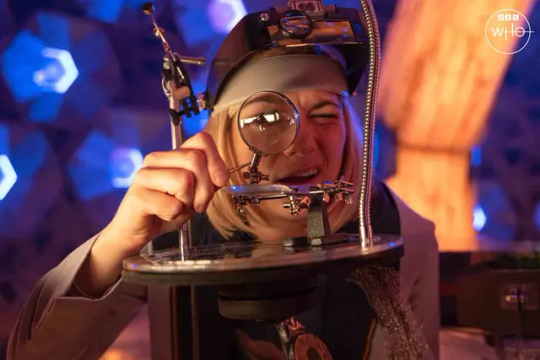
Despite not being many fan's top choice, the Thirteenth Doctor's era shared concepts with the Faction Paradox series surprisingly often. Some of these were explicit, such as The Paradox Moon featuring Siblings Same and Different (although these Siblings' Faction is otherwise unrelated to the FP Faction, as of 2023), whilst others are simply similarities in creative choices, again varying in how obvious they are, from the "Ashad" (Series 12 - The Timeless Children) resembling FP's technosapiens, to Time Lords "binding" time in Once, Upon Time (part of Series 13/Flux)
So, here I will attempt to list every possible connection between the Thirteenth Doctor/Chris Chibnal's era of Doctor Who and the Faction Paradox mythology
Firstly, an explanation as to why this is all happening...
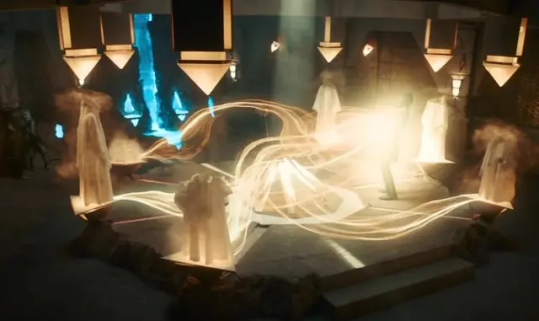
Explanation as to why the Thirteen Doctor is meeting Faction Paradox-esque entities.
The War has been ended for a long time, and the Great Houses have finally, actually, fallen (see The Timeless Children) leaving no one to hold up their imposed metastructure of history. Why didn't anyone invade in Series 1-7, before the Time Lords returned?, you ask. Well, it's not because The Day of the Doctor is a bootstrap, as I don't believe in perfect bootstraps, but rather because well... They did. During Series 1, the Reapers arrived, explicitly due to the lack of Time Lords (Father's Day), and so did a lone Dalek (Dalek), and finally the original Dalek Emperor's last Time War fleet (The Parting of the Ways). Then in Series 2, the Cult of Skaro arrived (Army of Ghosts/Doomsday), followed by Davros (The Stolen Earth/Journey's End)- who along with the Supreme Dalek, somehow survived the Crucible's fall (The Magician's Apprentice/The Witch's Familiar)- and then the New Dalek Paradigm emerged, from survivors of the War (Victory of the Daleks). All this interference from War-time participants is what's preventing pre-Anchoring entities entering the Third Universe, as it echoes the status quo which was so hostile to their very existence.
Oh, and "Dvapara Yuga" means "the Dark Times, as understood to not be an early period of universal history, but rather the state of history metatemporally predating Rassilon's anchoring of the thread"
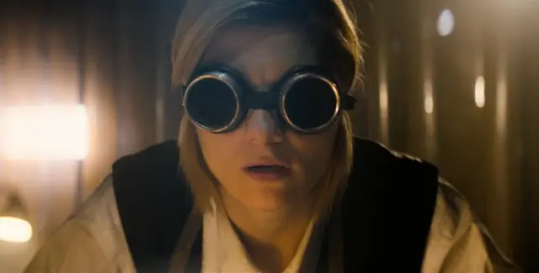
She is born out of an interaction with a past Doctor (Twice Upon a Time) - if it wasn't for acausal (and unintentionally) intervention of the First Doctor, the Thirteenth Doctor never would have existed. This is a bit of a stretch, as interference forwards in a timeline is much less paradoxical than the reverse, but this is her first appearance so...
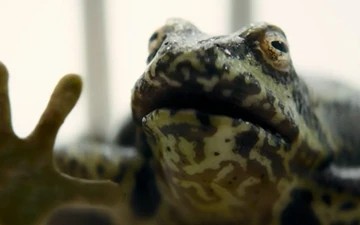
The Solitract, from It Takes You Away, is an intelligent & conscious universe, exiled from the main universe in order to allow for it's creation. "Creation" here probably refers to Event One/The Big Bang, but, if one is on the train of "the universe before the Anchoring of the Thread didn't have a beginning, and the Big Bang was retroactively added by Urizen [Rassilon]", then this is very easily re-interpreted as a mention of the early Sun Builders (a.k.a Time Lords) cleaning up their area of spacetime in preparation for imposing rationality on it. To be even more bold, I may suggest that this isn't a universe at all, but instead an intercreational, a class of being first mentioned in The Book of the War, although one type was first mentioned in the BBC Eighth Doctor Adventures novel The Taking of Planet 5, as a "Swimmer". I propose that the Solitract is not a Swimmer, or a Leviathan, but rather a smaller intercreational, perhaps growing out of the Third Universe (the main DW/FP universe), before being banished by the Great Houses. See Explanation as to why the Thirteen Doctor is meeting Faction Paradox-esque entities at the top of this post.
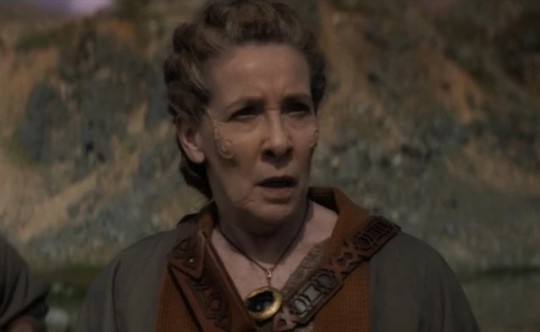
The Ux, from The Battle of Ranskoor Av Kolos, are clearly some gods from the Dvapara Yuga.
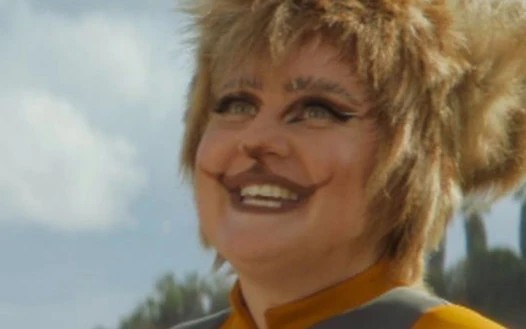
Orphan 55 features a future version of Earth which deviates heavily from most other depictions of it. Speculatively, this means the Thirteenth Doctor travelled to an aberrant timeline, or that the Ghost Point has somehow worsened since the degradation of the Great Houses's imposed metastructure, rather than healing.
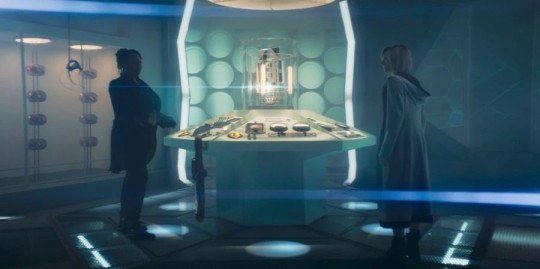
During Fugitive of the Judoon, the Doctor interacts with Gallifrey's distant past. I can't really explain this even by the standard explanation at the top of this post. However, one thing interesting to note is that the ancient Time Lord "Gat" considered "Mutter's Spiral" to be a "tiny galaxy". This is notable because Gallifrey is basically always said to be in the centre of Mutter's Spiral - that is, the Milky Way - and naming a galaxy as "tiny" kind of implies that you aren't from it. Maybe Gallifrey wasn't always in Mutter's Spiral, and got moved? Or maybe Gat and the Division come from some alternative Gallifrey? I don't know, just interesting to note.
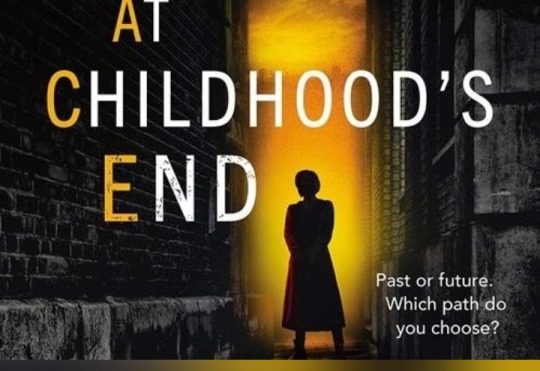
The novel At Childhood's End (written by Sophie Aldred, actor for Ace) featured Ace meeting the Thirteenth Doctor, and descriptions of the former's fractured timelines. Notably, the next time Ace and the Doctor met (in The Power of the Doctor), neither one of them mentioned this, almost as if the timeline in which it happened had fractured...
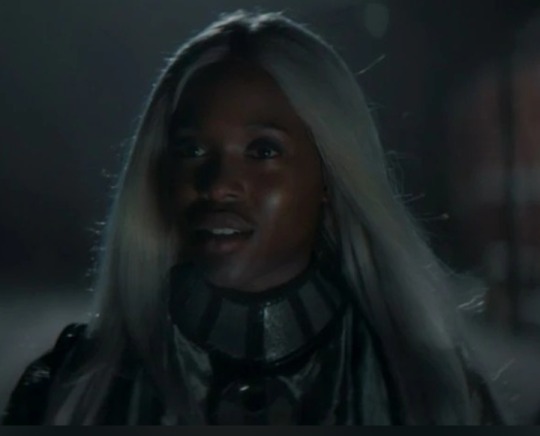
Rakaya and Zellin from Can You Hear Me? are clearly some kind of pre-anchoring gods like the Ux. In Time Lord Victorious short story The Guide to the Dark Times, it was confirmed that they were, specifically, Eternals (not the MCU kind), and another Time Lord Victorious text, a novel called The Knight, the Fool, and the Dead, claimed that Eternals were among the other inhabitants of the Dark Times, the "Old Ones". Interestingly, multiple Eternals do indeed appear in the "classic" series of Doctor Who, implying that the Anchoring did not fully remove them, but as they didn't appear in NuWho until now, I feel safe in speculating that the War somehow barred them from it - perhaps they'd joined the conflict, on the side of both the Time Lords, Daleks, the Enemy, and others, "helping out" wherever it benefited them?
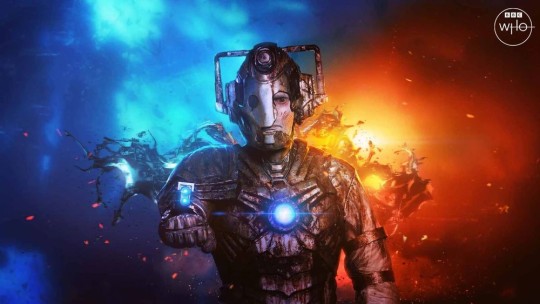
Ashad, first appearing in The Haunting of Villo Diodati, and then in the following serial Ascension of the Cybermen/The Timeless Children, is an "emotional Cyberman". Any readers of Faction Paradox could immediately draw the connection between this and Faction Paradox's "technosapiens", named as such partially to avoid infringing on the BBC's trademark, but also because The Book of the War showed that many sects of posthumanity had become cyborgs, but many were not emotionless and evil like the Cybermen.
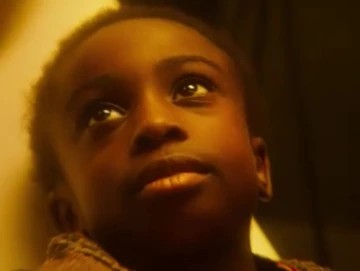
The Timeless Child, first appearing in The Timeless Children, is vaguely reminiscent of the idea hinted upon in The Book of the War that the Great Houses stole the power of regeneration from another species, in The Book of the War being the Great Vampires, and in The Timeless Children being the titular Timeless Child. This note of continuity was expanded upon by the writer @aristidetwain in his short story Out of the Box introduced the "Child-That-Was-Taken", intended to be a member of the Yssgaroth species, and to be the Timeless Child itself. Additionally, this Child was the motivator for the Great Vampires' war with the Great Houses, the Eternal War (a.k.a First War in Heaven).
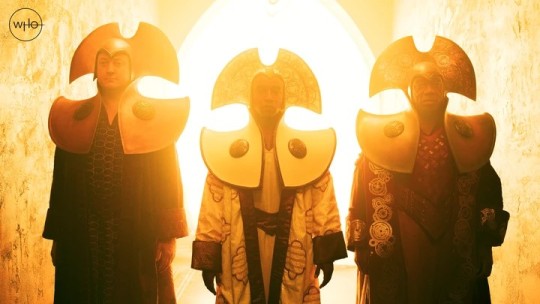
In The Timeless Children, Tecteun is shown alongside Rassilon and Omega. Previously, the figure alongside Rassilon and Omega was the Other, a version of the Doctor from before he was the Doctor. My personal fix for this, which I admittedly took from @/aristidetwain, is that there were many Others, assisting Rassilon and Omega at different points in time. Other Others may be the human Dr. Who from the novel Human Nature, the Eleventh Doctor "Cheesemaker" (The Lost Dimension), Osiris (in his car future), and the Sixth Doctor (The Scrolls of Rassilon)
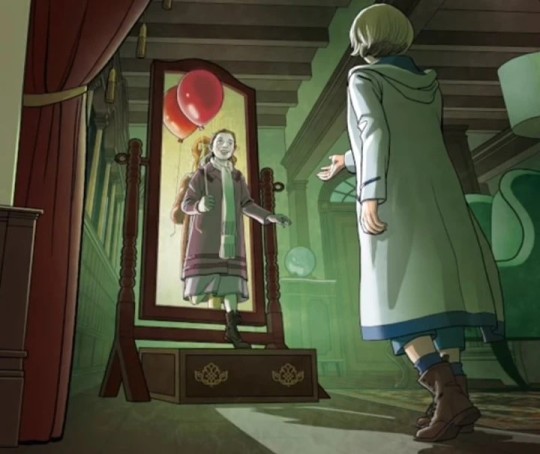
In Shadow in the Mirror, the Thirteenth Doctor released Aphasia / Daughter of Mine from her mirror of entrapment, despite the fact that Aphasia mentioned a "ginger haired doctor" who "believed himself to be the last" (likely Muldwych/Merlin), meaning that the Doctor had been interacting with Aphasia out-of-order, which is... Reasonably dangerous.
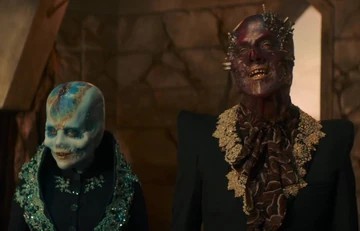
Throughout Flux, the villains "Swarm" and "Azure" attempt to remove the Mouri from the planet Time, effectively de-anchoring the thread. They're method, strangely, is to try to destroy the entire universe using "the flux".
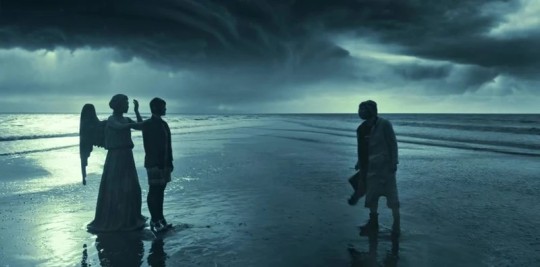
Village of the Angels features the first instance of Weeping Angels being shown to posses proper intelligence, as they ally themselves with Tecteun, presumably in exchange for something, and even more interestingly, they have a rogue member, suggesting power structures in their ranks. This isn't particularly Faction Paradox -related, but it feels like it is, and I hope Faction Paradox writers use Weeping Angel - analogues to continue to explore this.
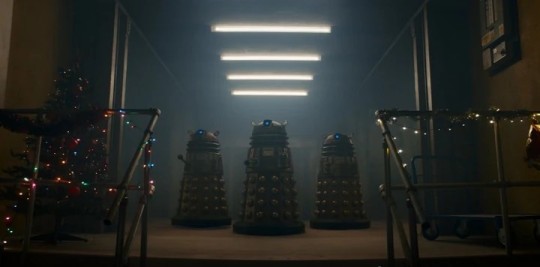
Eve of the Daleks features the Doctor "resetting" the TARDIS, causing a localised time loop. However, perhaps more notably, the Daleks which appear in this episode are "Dalek Executioners", which make their debut in Time Lord Victorious.
The Power of the Doctor won't be mentioned here, perhaps I'll grant it a full post going over all of its batshit-insanity (affectionate?) some other time.
This post was made after I saw @familyparadox remark at the high amount of Faction/Thirteen content
#faction paradox#doctor who#dweu#thirteenth doctor#jodie whittaker#chris chibnall#ashad the lone cyberman#eternals#long post
62 notes
·
View notes
Text
'Catherine Tate reveals that Doctor Who's 60th-anniversary ending initially took her by surprise. The star first joined Doctor Who as a guest in 2006's seasonal special "The Runaway Bride" before returning as the companion to David Tennant's Tenth Doctor in season 4. Tate and Tennant reunited to lead the show's 60th-anniversary celebrations across three adventures that saw a new Fourteenth Doctor (played by Tennant) once more with Donna, facing warring aliens, horrors from beyond the universe, and a powerful foe from the Time Lord past.
With a newly bi-regenerated Fourteenth Doctor joining the Noble family for a calm, normal life on Earth, Tate admitted in the BBC documentary Imagine... Russell T Davies: The Doctor and Me (via RadioTimes.com) that she had expected a tragic fate for the two characters. While Donna's fate defied Tate's Doctor Who return expectations of a tragedy, she ultimately feels that the ending was the best choice for both characters. Check out Tate's response below:
"It was so not what I was expecting. I thought there was going to be a massive, terrible final thing. [But] to end in the garden eating crumble is, of course, exactly where they should be."
What Comes Next For The Noble Family In Doctor Who?
Donna's potential fate became one of the most highly speculated points of Doctor Who's 60th-anniversary storyline. The character has endured so much tragedy, especially after season 4's conclusion left her at risk of a horrible death should she remember her adventures. Even "Wild Blue Yonder" almost ended with the Doctor rescuing her Not-Thing duplicate and nearly leaving the real Donna behind to be incinerated as the mysterious vessel self-destructs. However, despite the chances of her death being higher than ever and even showrunner Davies teasing a horrible fate, Donna survives, recovers from her Metacrisis transformation, and her faith in the Doctor is proven correct as he never let her down.
Ultimately, with the Doctor and Mel (Bonnie Langford) joining their family, the Nobles settle in France in the Doctor's new home, enjoying a quiet, peaceful life without having the fate of the universe on their shoulders. Davies has confirmed the Fourteenth Doctor is grounded for his foreseeable future and isn't set to take any joyrides into a Dalek fleet or stumble into a historical event, suggesting that he is content to live out what time he has left with his best friend. But that doesn't mean all members of the Noble family won't stumble into the Fifteenth Doctor's (Ncuti Gatwa) path, as Yasmin Finney may potentially return as Rose Noble in future Doctor Who adventures.
As part of a fan-favorite TARDIS team, the potential of Donna's Doctor Who return had viewers both excited and nervous about what may be. Not only could the character face certain death at the mere sight of an alien, but if mishandled, her return could negate the bittersweet but touching note that she and the Doctor parted ways on with his gift in "The End of Time." However, with Donna and the Doctor reunited in a comfortable life surrounded by loved ones, it is clear that Doctor Who's 60th-anniversary ending has left audiences and the cast satisfied.'
#Donna Noble#Catherine Tate#Rose Noble#Yasmin Finney#David Tennant#Ncuti Gatwa#Bi-generation#Doctor Who#60th Anniversary#The Giggle#TARDIS#Russell T. Davies#The Runaway Bride#Imagine...Russell T. Davies: The Doctor and Me#Wild Blue Yonder#Melanie Bush#Bonnie Langford
22 notes
·
View notes
Text
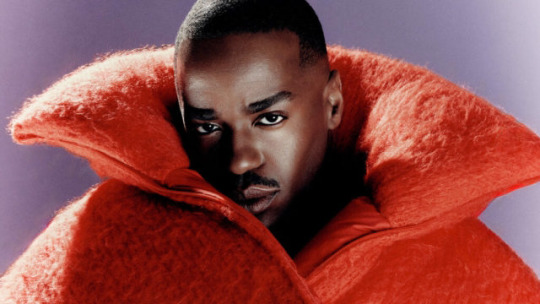
Ncuti Gatwa’s Rolling Stone article, the Doctor Who bits
“My Doctor is emotionally vulnerable. He hides it with humour, but he’s lonely,” says Gatwa of his forthcoming reinvention of the ever-changing Doctor. “I can’t say much more than that; I don’t want to spoil anything. But he’s also energetic! The poor cameramen struggled to keep up.”
To hear Gatwa tell the story of his casting, it almost sounds like he was granted a wish. One day he emailed his agent saying he wanted to play a role like Willy Wonka or the Doctor — and just a week later he was asked to audition for the part of the Time Lord. To prepare, Gatwa spent a week watching every Doctor Who episode since its 2005 revival. Although he had enjoyed the show previously, he never considered himself a habitual fan. He emerged from that binge-watching week a die-hard Whovian.
“I fell in love with it,” he enthuses, and he means it. There is undoubtedly a special quality about Doctor Who that’s hard to deny. “When you watch it, you forget all your troubles,” says Gatwa. “You go to space, or to another time. You have adventures.”
A big part of the show’s post-2005 story revolves around the Doctor having survived a devastating war that wiped out the rest of his people. This is a plot point that has since been undone and then redone; its current status in the canon is somewhat unclear. But it’s this that Gatwa latched onto because in that storyline he was able to see a reflection of his own life. As a child, Gatwa and his family fled Rwanda, escaping the genocide against the Tutsi minority. They settled in Scotland. “This person survived a genocide. This person fits in everywhere and nowhere. I am the Doctor. The Doctor is me. I decided that I had to get this role,” says Gatwa.
“I’m very nervous. I have a lot of sleepless nights where I lie awake feeling my heartbeat,” he says. It’s hard to imagine the pressure he must suddenly be feeling, but it’s understandable nevertheless. Doctor Who is a science-fiction family show that has run, on and off in some form, for 60 years. It’s also a nexus of so much of British culture. Like James Bond, the Doctor is a character through which Britain learns to understand itself, as much an icon of our changing times as a fictional being. The show’s connection to British identity means tensions can run high and fans can be cruel at times, seemingly over-protective because they feel that the show is something they own. They can also be bigoted in the most predictable ways.
“I’m the first Black man to play this character. The British press can be very mean,” he says of the reaction to his casting. But Gatwa is determined to remain steadfast in the face of criticism. “I just have to focus on the job and stay true to what the Doctor is: a mad scientist alien who has adventures and cares about everyone,” he says.
Thankfully, the Doctor Who team are helping him handle the pressures that come with his new role. “Russell T Davies has been amazing, too. He calms me down. He’s such an Earth sign. I can get very anxious, but therapy helps, and they’ve made sure that I have time put aside to have my sessions.”
Gatwa has also drawn support from some of the past Doctors, and has met Peter Capaldi, David Tennant and Matt Smith in person. He ran into Smith at a party before he’d been announced for the role and tipsily said “I’m following in your footsteps!” — a remark which baffled Smith until Gatwa was officially confirmed as the new Doctor. Gatwa tells me that Tennant set up a group chat where some of the previous actors stay in contact with one another, and they’ve all offered Gatwa support and advice on dealing with the press. After all, the only people that can really know what it’s like to be the Doctor are those who have been the Doctor. Once you’re cast, you’ll always be part of the show’s long history.
The series will return to BBC One (and Disney+ in other territories) in three specials this coming November, all — as far as we know — starring David Tennant once more. Gatwa’s first episode will be in a Christmas special set to air in December.
Doctor Who is all about reinvention and with Gatwa, this bold reimagining can be seen in his aesthetic interpretation of the offbeat time-travelling alien. Fashion might not be the first thing people associate with Doctor Who, but what the Doctor wears is an intrinsic part of the show. Tom Baker’s long scarf, David Tennant’s pinstripe suit; those are things that people immediately associate with it. But Gatwa’s Doctor might well be the first fashion-conscious one. “The day Russell invited me to meet everybody, they asked me what sort of costume I wanted. I showed them this Ralph Lauren collection that was in partnership with Historically Black Colleges in America,” he says. “I love those pieces, they’re so preppy and so Black. But then they asked what else, because they’d been thinking about lots of outfits, almost a different one each week. Which is new! I love it. The Doctor has travelled all of time and space; they’re going to have a sick wardrobe.”
Not that previous Doctors were badly dressed, mind. “I love Jon Pertwee, the Third Doctor’s, outfits. Lovely velvet jackets and frilly shirts. I feel a connection to him, our Doctors are the only two who dress like sluts,” he laughs.
The idea of multiple outfits has led to a fun press cycle where Twitter is regularly treated to a photoshoot of the Doctor and his companion in a completely new style each time. The most notable of these was a Swinging Sixties look, with Gatwa sporting a blue striped suit and an Afro. “The hair and makeup department have been incredible,” he exclaims. “Claire Williams and my own makeup artist, Bella, who is an old friend, worked so well together in creating my looks. Originally, we weren’t going to have the Afro, but Bella convinced me and I’m very glad she did. It’s such a shot into the bloodstream. It’s a statement — the Doctor is fucking Black.”
#doctor who#ncuti gatwa#dw txt#I looove the way he talks about the show/character#how passionate and excited he is makes me more excited
36 notes
·
View notes
Text
MASTERLIST:
Will try my best to keep it updated!!
Requests
Prompts
*************************
Doctor Who:
11:
Causalities and confessions - Summary: The doctor gets into trouble on one of his adventures, luckily you're there to patch him up.
Let me take care of you - Summary: You're a headstrong, mother hen of the group. You always look after everyone without hesitation. But what happens when an adventure goes wrong, leaving you shake and in need of support?
By your side forever - Summary: The doctor feels himself losing hope at the constant return of his worst enemy, but you remind him he's not alone. Based on S5 Ep3 Victory of the darleks.
I should hate you - Summary: When your brother and his wife get taken by the weeping angels, the doctor is the only person you can turn to. Based on S7 Ep5 The angels take Manhattan. Reader is Rory's sibling.
Dream Lord? - The doctors true feelings about himself surface in a battle between reality and the subconscious. Based on S5 Ep7 Amy's choice
Past Versions - you have a run in with an oddly familiar face. Based on S7 Ep16 The day of the doctor.
10:
Send you away - After a trip ends up with you being captured, Teh doctor starts to question his ability to protect you.
Marvel:
Loki:
Safety - Nightmares aren't uncommon for you. But when a particularly graphic one wakes you up, you find comfort in none other than your favourite Norse god.
Freedom of the fall - The tension between tony and steve results to be too much for you. Based during civil war.
Suffocated
Losing Game - You and loki were a losing game, right from the beginning. And you've reached your breaking point.
Bucky Barnes:
Time to heal - For months, you had hated the avengers for what they'd put you through. You never planned on seeing them again. Until you ended up on the same rooftop.
I don’t hate you - A lonely nights in the avengers compound turns out to be the best time to bare your heart to someone.
Tony Stark:
Stay with me - The team has recently found out about your anxiety and panic attacks. Tony refuses to let you suffer alone.
Criminal Minds:
Aaron Hotchner:
Shot for love - An accident on a case makes you realise just how much you care for your boss.
As much as me - Your darkest thought resurfaces at the worst time. Luckily, you're not alone.
You matter - A personal connection to a case takes its toll on you. Aaron reminds you the importance of sharing your burdens.
Dance with me? - With the threat of Garcia's royal ball themed party, Hotch takes it upon himself to make sure you're well prepared.
Just so i could call you mine Pt2 Pt3 (Complete) - Hotch chooses to believe Haley over you when it comes to your relationship, causing you to lose the man you love.
Derek Morgan:
I’ve got you Pt2 Pt3 (Complete) - Being friends with BAU agents can come with complications. And when one of those arrives at your doorstep, Derek is there to help.
Spencer Reid:
Look at me - Something about this case hadn't sat right with you, and you couldn't figure out why. Until it all came crashing down.
BBC Sherlock:
Hold me - Sherlock doesn't realise how touch starved he truly is until he meets you.
High for love Pt2 - Sherlocks using again and you have to look after him. But what happens when he says something he probably wasn't supposed to?
The men you meet Pt2 - Your feelings for sherlock are driving you insane. In an attempt to get over him, you agree to a date with a guy you meet at a coffee shop. However, this seems to bring more harm than good. (Ongoing series)
NBC Hannibal:
Held through the darkness - You didn't realise how much you needed the comfort of your former psychiatrist
#11th doctor x reader#11th doctor x you#doctor who#matt smith#matt smith x reader#the doctor#tardis#criminal minds#bau#aaron hotch x reader#derek morgan x reader#spencer reid x reader#marvel#tony x y/n#tony stank#tony x reader#bucky x y/n#bucky barns x reader#bucky barns fanfiction#loki layfeyson x you#loki of asgard#loki x reader#masterlist#sherlock fanfic#fanfiction#fanfic#angst#fluffy
120 notes
·
View notes
Text


"𝙸 𝚊𝚖 𝚞𝚜𝚞𝚊𝚕𝚕𝚢 𝚛𝚎𝚏𝚎𝚛𝚛𝚎𝚍 𝚝𝚘 𝚊𝚜 𝚝𝚑𝚎 𝙼𝚊𝚜𝚝𝚎𝚛."
Indie Headcanon based roleplay blog of THE MASTER from DOCTOR WHO. Written by Serenity (21+) with influences from Classic Who, Modern Who, and Extended Universe Content; BBC Past Doctor's Adventures, Virgin New Adventures, and Big Finish Audios with particular emphasis on ‘The Dark Path’, ‘Divided Loyalties’, ‘The End of Time’ and the audio ‘Master’ + doctor who comics and novels. Anti-Timeless Child.
GOOGLE SITE . HEADCANONS . INTEREST TRACKER . WISHLIST
#PROMO ;; We are Stars#dw rp#doctor who rp#doctor who roleplay#time travel rp#dw roleplay#villains rp
19 notes
·
View notes
Text
By Morning, We Might All Be Dead - Horror of Fang Rock, 1977
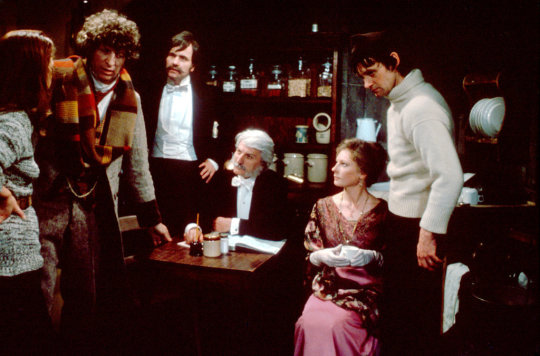
Horror of Fang Rock marks a significant turning point in Doctor Who's history which is odd because, insofar as what actually makes it to screen, it would seem reasonable to assume that this serial was just business-as-usual. For the past three years, under the watch of producer Philip Hinchcliffe and script editor Robert Holmes, Doctor Who had overgone a successful transition from an action-packed, primarily earth-based series into a more macabre, gothic-horror infused programme. Despite this turn away from what was a very successful and family-friendly approach, Doctor Who was suddenly at the height of its popularity with the fourteenth season, that finished airing in April 1977, pulling in ratings of approximately eleven million viewers each week. Tom Baker’s fourth incarnation of the eponymous hero was riding an enormous wave of success but, nonetheless, it was decided that things must come to an end. Following vocal criticism of the series' violent and adult direction, including some infamous comments from Mary Whitehouse, the BBC informed Philip Hinchcliffe, during pre-production season fourteen's final serial, that he would be quietly moved on from Doctor Who. Hinchcliffe was redeployed onto a different, notably less family-oriented, programme in the form of Target, a police drama. Swapping in this place would be the creator of Target and its original producer, one Graham Williams.
Williams took up the reigns under strict instructions to reshape the series into something more palatable for the younger viewers. Under his watch, Doctor Who would undergo a drastic, though steady, series of changes away from gothic horror film-pastiches into something more camp, absurdly comedic but high-concept science-fiction adventure serials. This was the beginning of a period where Douglas Adams would be regularly writing and script-editing for the show. Intentionally or otherwise, this was a tonal and stylistic shift that took place over the entirety of season fifteen and, in my opinion, would not entirely find its feet until Williams’ final season. However, at the very top of his reign is something quite different and a story that feels rather fittingly like a last hurrah to the old guard.
Horror of Fang Rock, if you did not already take the hint, could more than comfortably pass as a Hinchcliffe era Doctor Who. So much is this the case that I frequently stumble across claims that this story was commissioned under his watch even though there is no evidence to suggest such a thing. In fact, it would be impossible. As previously mentioned, Hinchcliffe was made aware of his new assignment before production on The Talons of Weng-Chiang, had even wrapped. All that was set in place for season fifteen while he was still producing were the contracts for our two leading actors and both were negotiated by Williams. Louise Jameson was convinced to sign on for a second year as Leela, despite her difficult working relationship with Tom Baker, on the condition that she would no longer have to wear the uncomfortable brown contact lenses from season fourteen. This stipulation accounts for the somewhat left-field moment in this story's climax where Leela is temporarily blinded only for her sight to return but with different pigments in her eyes. The script does its best to make the scene into a character moment with Leela naively disobeying the Doctor and then asking him to slaughter her when she becomes maimed but it remains a pretty terribly tacked on scene. Tom Baker was unimpressed with Jameson's renewal. Following his insistence to Hinchcliffe and Holmes that he did not need a co-star at all after Elisabeth Sladen's departure, he had grown to dislike Leela as a character finding her too violent and sexually provocative for the programme's audience. Regardless, he signed on for the new season with the suggestion that it would perhaps be his last.
Even though Hinchcliffe had left the series, Robert Holmes remained in his post for the first half of season fifteen and, as such, a very smooth transition can be seen occurring from his sensibilities into that of his successor Anthony Read. For the first story of the season, Holmes called upon his immediate predecessor Terrance Dicks and, aware of the programme's horror sensibilities at that time, offered a script originally entitled The Witch Lords. Later renamed The Vampire Mutation, the scripts were a pastiche of classic Dracula adaptations in the same vein as the previous seasons’ forays into classic literature and cult films such as Frankenstein, Agatha Christie, Sherlock Holmes and so on. However, due to the BBC’s fears of such a production impacting their forthcoming, prestige adaptation of Dracula, the serial was abandoned forcing it from first in production to second and beginning a scramble for a late replacement*.
Horror of Fang Rock was devised after Holmes suggested an historical based around Edwardian lighthouses, citing Wilfrid Wilson Gibson's 1912 poem Flannan Isle as a basis from which begin. Entirely unfamiliar with lighthouse operations of the period, Dicks frequently claimed that this was Holmes’ attempt at a comeuppance for when he was commissioned by Dicks to write 1973's The Time Warrior with no knowledge of feudal English castles. The Flannan Isle poem is based upon a real incident from December 1900, when a supply ship discovered that the three-man lighthouse crew on Eilean Mòr, one of the Flannan Isles in the Outer Hebrides, had vanished without a trace. Dicks clearly took the basic premise of the poem and the imagery and aesthetic to craft this particular tale. The poem is directly quoted in the serial itself and, yes, it is a very lovely piece of writing that Tom Baker delivers excellently. I do struggle, however, to find a particularly interesting subtextual connection between it and the serial that aired. The story could have actually been Horror on Flannan Isle and nothing would really change which makes me wonder why Dicks just didn't go for that (besides Fang Rock being an obviously more pulpy and memorable title). As is, the poem recital just feels like an unnecessary in-text acknowledgement of Dicks' inspiration.
Given how late a replacement Horror of Fang Rock was, director Paddy Russell had already begun preparing for The Vampire Mutation and was disappointed that the story was abandoned. Russell had already worked on the series thrice before, most recently for season thirteen's Pyramids of Mars, and Fang Rock would prove her final contribution. Russell felt restricted technically and creatively by the lighthouse setting and when scheduling difficulties forced the production to the lesser Pebble Mill Studios, the working environment only became more difficult.
Perhaps it is in part thanks to these tensions, however, that Horror of Fang Rock comes out so well in the wash. This story is dripping with tension and drama. There is an extraordinary claustrophobic quality to the serial that is surely enhanced by the smaller studio space and even more cramped than usual sets. Aside from some occasionally laughable CSO, the disappointingly dodgy model ship and one other awkward effect I'll get to later, Horror of Fang Rock is a stellar production from the costumes to the lighting to the film excerpts to the wonderful score from Dudley Simpson. What Horror of Fang Rock captures better than, dare I say, Pyramids of Mars is a genuine gothic horror flavour. All of the iconography one could expect from such a tale such as foggy nights, ghostly apparitions, grisly deaths and devious characters are all on display here and the story feels incredibly accurate to the era it is calling back to. Horror of Fang Rock has an incredible sense of atmosphere even in the less noticeable choices such as the foghorn which only gets creepier and more intense as the stakes escalate across the story.
None of this is where Horror of Fang Rock excels the most, however. Where this story really shine is in its script, more specifically, in its characters and this is a mightily impressive feat for something assembled in crisis. Despite his closest association with Doctor Who, and his most prolific one, is with the Pertwee era, there is a good case to be made that this is Dicks' tightest script. Every member of this ensemble is wonderfully well-realised, even those with quite little screen-time. Each character feels three-dimensional and distinct from the others. It helps immensely that Dicks' simplistic approach to storytelling stands apart from Holmes' who would have likely shifted focus further away from the cast, relegating them to caricatures rather than characters, and onto the unholy, universe-ending threat. The story begins introducing us to the three keepers; Reuben, Ben and Vince. Immediately, the dynamic between the trio is clear and compelling. We have Reuben as the old hand who is set in his ways and performed excellently by Colin Douglas, Reuben is set in his ways; “In England we have proper customs”. He is a superstitious, sarcastic, racist and arrogant figure. Ben on the other hand, is his counterpoint; embracing the turn of the century. He is all in favour of electric technology, is highly intelligent yet he also carries an air of superiority, quick to boss around his crew mates and scold them. And then there is poor Vince, the naive, new recruit whose innocence and charm serves to make him the most endearing supporting character in this cast by a wide margin.
The beginning of this serial is just excellent. Again, the whole first part is dripping in atmosphere and makes for an incredibly tight watch. Without ever mentioning the year, the setting is made abundantly clear. Fang Rock story offers some wonderful establishing moments such as the philosophical argument between Vince and Reuben that just plays out like a discursive of the period in the best way possible. This is how you can communicate setting and themes in a script in a way that is clear but not insulting to the audience. That being said, Dicks clearly did his research into lighthouses with a pretty blunt, however delightful, dumping of period accurate facts at every opportunity. It is always nice when Doctor Who returns to its educational roots in some way. Dramatically, a lighthouse is a brilliant setting for a thriller like this with its isolated location and limited cast, stranded, allowing for a lot of suspense and discomfort in the plot. On paper, there is little to seperate this from the Troughton era base-under-siege yet the tone and approach just feels a world away. Even on a basic thematic level, this setting also proves a delightfully rich choice. Lighthouses, after all, signify dangerous coasts. They are used to warn off ships and this is exactly what it is used for in the conclusion of this story. Albeit, not for that kind of ship.
When we do meet up with our heroes, we find Tom Baker and Louise Jameson on top form. Funnily enough, though, this serial was criticised by Jameson for doing her character a disservice, even going so far as to suggest that Dicks was writing with Sarah Jane in mind instead of Leela. Thankfully, due to her insistence, the finished product serves her a lot better. Whether it is ultimately down to Dicks, Holmes or mostly Jameson's performance, I think that Leela is written very realised in this story and it produced some of her best moments, such as her beautiful first scene with Vince and really every interaction with Adelaide. Pairing her off with what could almost be a more traditional companion archetype (how different are Adelaide and Victoria?) was a brilliant choice and very effective in selling her uniqueness as a leading lady in Doctor Who.
Behind the scenes, this serial also marked a turn for the better in Jameson and Baker's relationship. After being repeatedly upstaged by her co-star despite it not being what they rehearsed, Jameson confronted Baker about his behaviour. It is no secret that Tom Baker's behaviour throughout the Graham Williams era became something of an ongoing issue and that is no less the case with the second serial he produced. Baker severely clashed with Russell on-set due to the former's lack of respect for his director’s regimented and meticulous practice. Baker also became frustrated at Russell's disinterest in taking suggestions from him to alter the material. The most often repeated anecdote from this conflict recalls an incident where Baker flatly refused to take on Russell's direction and repeatedly entered the scene too early as to remain in shot. Following the difficult final block timing the confrontation between the Doctor and the Rutan, Russell decided she would never return to the show and later cited Tom Baker's "difficult" behaviour as the core reason why;
"Tom Baker was easy to deal with at first, but the part went to his head completely. By the time I did Horror of Fang Rock, he was desperately difficult to work with. His input got totally out of hand. His attitude to his fellow actors was extremely difficult, his attitude to his director was extremely difficult, and his attitude to the crew was extremely difficult. For instance, it was always everybody else’s fault, and never Tom’s. His idea was to have that show to himself. He didn’t want an assistant, and he made their lives hell. Louise Jameson went through hell on that show, and that lady is a very good actress. Fortunately, she’s very tough, and she got a lot of support from everyone else. I found her excellent to work with, but Tom hardly spoke to her, and when he did it was usually something nasty".
Frustratingly, tom Baker's ego was not without reason. The Doctor comes completely alive in this serial thanks to Baker's captivating performance whose sour demeanour on-set manifested as one of the moodiest and most alien performances of his entire run. His performance is electric and he imbues so much presence and awe in every moment he deliberately plants himself in the centre of the frame. The Doctor has any number of charming moments and memorable lines in this serial (“The Malicious Damage Act 1861 covers lighthouses”) but the tone of performance is so distant and bizarre that it leaves him as barely even a comfort for the audience in this unsettling arena, let alone the cast around him. This story shows the Doctor as a fighter for the working class all the way through offering little to no encouragement to the toffs but immediately jumping to the defence of Harker and Vince. Like all of the best stories of this period, Genesis of the Daleks or Pyramids of Mars for notable examples, the Doctor's behaviour goes a long way toward selling the threat. Certainly there is levity and flippancy but those moments of whimsy, for lack of a better term, are complimented by the gravitas and seriousness when dealing with the matter at hand. The villain, the horror and tragedy of the story is never undermined with the humour and is expertly balanced. Horror of Fang Rock also shows that the Doctor is deeply fallible. This is a character who is allowed to make enormous mistakes, such as the chilling moment at the end of episode three when he becomes directly responsible for the situation escalating despite believing he is doing the right thing. It is something that I would have loved to see taken even further in this story and beyond, like how we would eventually get with the Twelfth Doctor. The Doctor's actions are pivotal to the plot changing for the worst and this is one of very few Doctor Who stories where the entire supporting cast is killed. Any form of acknowledgement and reflection from the Doctor about this would have gone a hell of a long way.
In the second episode, three new characters arrive in the form of Palmerdale, Skinsale and Adelaide. A trio of intensely dislikable, greedy, upper class idiots. Palmerdale is an Edwardian socialite attempting to climb above his class, Skinsale a war veteran turned politician and Adelaide who, if she ever worked for me, seems like the most hysterical and witless secretary of all-time. Despite being offered numerous opportunities to perform honourable actions, the three maintain no sense of loyalty to each other, no care for the crew of their ship, frequently betray their selfish morals and sexist values and are obsessed with upholding their respective reputations and statuses of being “honourable” gentlemen and a lady. How laughable. As the story goes on, their behaviour continues to jeopardise the lives of others and, eventually, their own with Palmerdale and Skinsale both being trapped and killed by the creature thanks to their own actions and greedy ambitions.
Again, these characters are just incredibly well-written. There is a stark contrast in the use or language between the lighthouse crew and the gentry that effortlessly illustrates the cultural divide of the period without any dialogue directly acknowledging such a thing. When the toffs do speak to the keepers, they remain emotionally distant, referring to them only in generalities or by their surnames. Compare that to the Doctor and Leela who immediately talk amongst Vince and Reuben as their friends and equals. Horror of Fang Rock showcases the worst of what Edwardian England has to offer from people of all walks of life.
This, naturally, allows for some strong thematic beats to be teased out of these characters. The most blatant, of course, is the previously alluded to parallel between the perceived savage and the supposed enlightened lady. It is the latter of these who is seeking answers in horoscopes and the former who suggests broadening her mind with the world of science and education. Skinsale is an ex-military character and the natural parallel to the alien threat who itself is a scouting soldier. I am sure it is no mistake that the self-proclaimed exemplar of the British military dies in a pathetic scramble to get his hands on some diamonds. Unlike everybody else on the Rock, the Rutan is a perfectly adaptable creature yet it has no individuality. Perhaps Is this fact that makes it such a powerful, concentrated threat and the humans such an emotional, self-defeating rabble. None of the cast, after all, show any signs of being capable to adapt to survive. Save for Leela and the Doctor, everybody in the story is close minded and dies blindly sticking to their principles. Perhaps this is a more deeply cynical notion than Dicks intended to convey. Regardless his story creates a wonderful contrast of the animalistic/tribalistic notion that the Rutan embodies, killing everybody in sight to determine the strength of humanity, versus the supposed civilised qualities of Edwardian ladies and gentlemen who squabble and are selfish and ultimately bring about their own demise. Horror of Fang Rock marks the only appearance to date of the Rutans in Doctor Who, first mentioned in The Time Warrior as the arch-enemy of the Sontarans. I wonder if Dicks chose this threat specifically to subtly rib at Holmes for the difficult assignment. It is a very amusing choice to depict the villain of the stiff, squat and toadish Sontarans as a nebulous, shape-changing jellyfish but it has to be said that the realisation on-screen is less than remarkable. It does not kill the serial but I do think the threat is much more menacing as an unseen, bubbling threat. The special sounds from Dick Mills are decidedly more iconic and frightening than the design and operation of the puppet.
But a ropey monster effect is really the most minor of gripes to have with a Doctor Who story, especially of this period. Horror of Fang Rock is a hell of a good story. The production is remarkable with fantastic characters and a delightfully chilling threat. This is a serial that never fails to suck me in whenever I put it on and remains one of my all-time favourites. Yes, there are some lovely thematic ideas going on here that are deeply rooted in the culture of being English and the traditions of ghost stories and murder mysteries but this is not the core appeal. Let its not kid ourselves into thinking that this is a hidden Kinda or Ghost Light. Terrance Dicks did not do those kinds of Doctor Whos. What he does offer us here, in arguably his sole proper contribution to the Hinchcliffe/Holmes mould is a compelling, expertly structured horror story with just enough meat to it. As the Williams era begins to take shape in the serials following, I do feel a twinge of disappointment that stories of this vein so quickly disappeared from his tenure. The very last gasp of the gothic horror Who would come two stories later with Image of the Fendahl and the Williams era would never again aim for 'scary' as a target goal (by orders of the BBC, for what that disclaimer is worth).
But perhaps this is what the beginning of the new era really needed; a positive affirmation of what the programme had become, demonstrating what it was at that time in as straightforward and effective a manner as possible. From this statement, we can move on and head into new directions. And let us be fair, even if Williams did go for the old-school scares again, could he really have peaked much higher than this?
*The original vampire serial was not entirely abandoned. It finally made its way to screen in 1980 as part of season eighteen, albeit, heavily rewritten and retitled State of Decay.
#doctor who#tv#culture#history#actors#horror#thriller#mystery#horror art#gothic#monster#rutan#fourth doctor#leela#leela of the sevateem#tom baker#classic who#1970s#tv review#review#analysis#behind the scenes
8 notes
·
View notes
Text
On the latest instalment of Dale's Ramblings, BBC Books make their first proper engagement with the Seventh Doctor's era and we pick apart the myth of Season 27 in Mike Tucker and Robert Perry's Illegal Alien.
Like what I write? Consider supporting me on Ko-fi!
#doctor who#bbc past doctor adventures#seventh doctor#ace mcshane#cybermen#mike tucker#robert perry#virgin new adventures#obliquely but c'mon it's relevant
4 notes
·
View notes
Text
Canceled Doctor Who Series Makes The Best Disney+ Spinoff Idea Way More Likely
BY MARK DONALDSON
The cancelation of a long-running Doctor Who series on expanded media makes a popular Disney+ spinoff idea an increasingly likely possibility. Since Doctor Who's global streaming deal with the Walt Disney Corporation was announced, fans have eagerly anticipated a raft of spinoffs to rival the Marvel Cinematic Universe. Russell T Davies has repeatedly stated his own vision for Doctor Who in a post-MCU world, seeing the show's potential as a big sci-fi franchise comprising the parent show and multiple spinoffs. There is a persistent rumor that a UNIT spinoff led by Kate Stewart (Jemma Redgrave) will follow Ncuti Gatwa's first Doctor Who season and now another beloved character could also get their own show.
Audio production company Big Finish has announced that the Alex Kingston-led The Diary of River Song will end with season 10, released in August 2023. The series began in 2015 and has depicted Professor River Song's adventures through time and space, pairing her up with past incarnations of the Doctor and various old enemies, too. It's been a well-received series for Big Finish which begs the question of why it's ending. It could be something as simple as former E.R. star Alex Kingston's work commitments, or it could hint that a River Song spinoff is in the works for Disney+.
River Song's Series Ending Teases A Doctor Who Spinoff On Disney+
The Diary of River Song season 1 was released on Christmas Day 2015, just minutes after her final appearance in Doctor Who. While it could be purely coincidental, River Song's Big Finish series ending just months before Doctor Who begins streaming on Disney+ feels important. In terms of the modern series, Big Finish generally uses Doctor Who characters after their time on the show has ended. For example, they'll launch spinoff series for both The Fugitive Doctor (Jo Martin) and The Master (Sacha Dhawan) later in 2023. Having characters' audio adventures run concurrently with their on-screen counterparts is generally frowned upon as part of Big Finish's deal with the BBC.
During Russell T Davies' first Doctor Who era, he was in regular contact with Big Finish as they tried to avoid overlaps with story ideas and monsters. It's likely that this relationship will still be the same in RTD's new Doctor Who era, raising interesting questions about the timing of the River Song series ending. The best River Song episodes always feel like the Doctor is guest starring in somebody else's show, so her own TV series is long overdue. The new Disney+ era of Doctor Who could finally realize this long-held dream of River Song fans, and the ending of her Big Finish series feels like a cleaning of the slate.
A River Song Spinoff Must Avoid The Biggest Mistake With Her Character
Although it was the idea of River Song's creator Steven Moffat, The Diary of River Song's reliance on her interacting with past Doctors reduced the character slightly. Rather than being a time traveling archaeologist with dubious morals, River was defined as being the Doctor's future wife. Later entries in the series addressed this problem and sent River to investigate archeological mysteries and stride out in the universe on her own. This is exactly what the tone of a River Song-led Doctor Who spinoff on Disney+ should be.
A gun-toting, time traveling archeologist adventuring through time and space is a great pitch for a TV show. It's rumored that Steven Moffat is back for Doctor Who season 14, so it wouldn't be at all surprising if he and Russell T Davies has discussed the prospect of what a River Song spinoff would look like. This, combined with the surprise ending for her Big Finish series hints at exciting times to come for River Song.
18 notes
·
View notes
Text
The BBC Eighth Doctor Adventures "War in Heaven" arc, as it may have originally been
The BBC Eighth Doctor Adventures, at their start, didn't have any arc set-in-stone, and so author Lawrence Miles wrote the masterpiece Alien Bodies, kick-starting the "War in Heaven" arc. However, on 3 July 2000, The Ancestor Cell was published, putting an end to the War in Heaven arc, at least within the EDA range.
Before this novel was published, Lawrence Miles had other ideas for the War in Heaven, and I for this post have attempted to reconstruct a rough timeline for what could have been, from the available evidence. Bear in mind that I have taken some creative liberties and speculation. As there will be quite a few different stories in different ranges, some released and some unproduced, I've decided to code them for convenience: first off, assume everything is a published EDA unless told otherwise - then, green is for a part of the "Bernice Summerfield" New Adventures, blue is for Past Doctor Adventures, orange is for anything else, and bold is for unproduced (these can be combined).
Prelude
Down (September 1997)*: the Gods are introduced, setting up a War seemingly separate to the War in Heaven. This most likelywasn't originally intended to tie-in to the EDAs, or be part of the War in He and, but was brought in by Dead Romance.
Alien Bodies (November 1997): Faction Paradox, the Enemy, the Celestis, and the state of Gallifrey and it's cloneworlds during the War in Heaven is introduced and established as being in the Eighth Doctor's future.
Unnatural History (June 1999): small skirmish with Faction Paradox. It is altogether unclear whether they come from the War or from the Eighth Doctor's time
Act 1
Dead Romance (1 March 1999): the universe of the VNAs, that of Chris Cwej, is implied to be in a bottle in the EDA universe, as itself contains a bottle. Later stories would draw continuity with the VNAs, and The Ancestor Cell (not counted in this list) saw the merger of the bottle into the main universe. This is also implied to be the case by the fact that Cousin Eliza - Christine Summerfield - appears to be in the prime universe by The Faction Paradox Protocols. Personally, I reconcile these by concluding that only the later VNAs starring Bernice Summerfield, which lacked the BBC Doctor Who license, are part of this "bottle", and that Christine used the Gods of that universe to climb out of it, as she implies at the end of the novel.
Interference: What Happened On Earth (August 1999, part of "Interference"): a major interaction with the War; the Doctor prevents the destruction of Earth by wartime powers, thus marking his first major intervention in the War, as Earth is a cradle point of casualty. The War also infects the Doctor's timestream back to his third incarnation, in Interference: What Happened On Dust.
Toy Story (1999/2004)*2: Lolita talks to the TARDIS.
Interference: Foreman's World (August 1999, part of "Interference"): I.M. Foreman reveals the bottle universe, says the people within created their own bottle universe, and it is lost. This effectively confirms the implementation in Dead Romance. Interestingly, as far as I know, most people read Interference first, completely missing the fact that the ending of it is meant to confirm Dead Romance, not foreshadow it. At least, I completely missed that.
Beneath the Planet of the Spiders (after "Interference"): The Fourth Doctor combats the Eight Legs in place of the Third Doctor, and presumably the effects of Interference are further explored.
Valentine's Day (after "Interference"): the Doctor exiles himself for fear of regenerating into something worse than Faction Paradox could imagine. With his absence, the Daleks rise to power. The Doctor then trains a replacement, with the combined help of the Time Lords and Faction Paradox. Ideas of a replacement were adapted by Miles into The Adventuress of Henrietta Street, where the replacement is Sabbath Dei.
The Taking of Planet 5 (October 1999): Mictlan, realm of the Celestis, is destroyed, and the Doctor aids in saving the rest of the universe.
The Shadows of Avalon (2000): The specifics of Compassion's transformation into a TARDIS, and potentially the transformation in totality, were probably not part of Miles's original plan. However, he notably didn't contradict it in The Book of the War, so this will still be included.
Act 2
From here on out, there aren't any actual plans for Eighth Doctor novels, although that is likely just due to the small gap between Interference and The Ancestor Cell. Nevertheless, this has the interesting diegetic effect of making it seem that the War has started to escape the Eighth Doctor, and is widening it's girth.
First I shall list the unproduced novels that would fit into here, and then offer my diegetic summary:
The War (after 12 March 1999): Pertaining to an unknown range, perhaps the Past Doctor Adventures (as it also included the non-past Infinity Doctors and would have included the future Requiem), this would have featured Joanna Lumley's Thirteenth Doctor being in a concentration camp with other "strays from other realities", all taken from BBC sitcoms which the BBC still had rights to. @verityshush commissioned Wenart Gunardi to make a cover for this, in the style of the Virgin New Adventures (the anachronism fits)
Requiem (after 1998's "Interference"): There is a "huge, bone-like thing" in the sky over a war-paranoid Gallifrey. Miles contested that "The Ancestor Cell" copied the idea of this, but the thing in the huge black bone structure in Requiem reportedly was totally different to in "The Ancestor Cell".). There would have been 5 sequels to Requiem, all following this "future incarnation of the Doctor". Presumably these would have crossed over with the BBC Eighth Doctor Adventures at at least one point, if not more.
Below is my deigetic imaging of what could have been.
The War in Heaven expands beyond the Eighth Doctor's timestream, and begins infecting both alternative timelines (The War) and future incarnations (Requiem). The future incarnations may be an "infection" of the developing War, as the Doctor "originally died on Dronid", but as it's heavily implied that's not quite what happened, he could have easily experienced Requiem first and then gone back to the beginning of the War (which should be impossible, but just look at how many times the Eighth Doctor interacted with the future War) to be found on Drornid.
Despite expanding beyond the Eighth Doctor, it still chases him, or to be more specific, the War Queen Romana chases him, Fitz, and their timeship Compassion. Eventually, in unknown book (unknown because future novels with the War Queen Romana never even got to the pitching state, but feel like they should have existed), the Doctor would regain his TARDIS, and in my ideal world it would have regenerated (not because I don't like the Victorian parlour, quite the contrary, I the arc would be more impactful if it had a permanent effect). I think that after he gets his TARDIS back, the Eighth Doctor should just keep on as normal, not really seeing the War all that much, perhaps even his TARDIS has engineered itself to not ever collide with it again - without the Doctor's knowledge? - but there's no "cataclysmic", The Ancestor Cell -like removal of the War.
Compassion, now a timeship separate from the Doctor, Fitz, and the Doctor's TARDIS, would leave the "TARDIS team" and eventually get the companion "Carmen Yeh"*3
Finally, an unnecessary but nice note on how Compassion become the mother of timeships:
The Book of the War, specifically the entry on "Carmen Yeh", features Compassion confronting the War King, and entering into diplomatic relations with him. This is likely the intended point by Miles of when Compassion would have aided in the reproduction of the 103-forms, as opposed to The Shadows of Avalon's version (rape).
*I have not actually read this book, my info for it derives solely from Nate Bumber's blogspot about the Bernice Summerfield War
*2 This was first published in the charity anthology Perfect Timing 2, and then later reprinted in Mad Norwegian Press's edition of Dead Romance
*3 In the Perfect Timing short story "Schrödinger's Botanist", Carmen Yeh would meet Compassion and join her.
Tagging (with permission): @doctornolonger
#faction paradox#doctor who#eighth doctor adventures#the war in heaven#eighth doctor#lawrence miles#essay#a wartime paradox
62 notes
·
View notes
Text
'Doctor Who executive producer Russell T. Davies warned everyone that the 60th anniversary special episodes were going to introduce some interesting new twists to the mythology of the series meant to set the stage for actor Ncuti Gatwa’s debut as the Time Lord. Some of those changes — especially those specific to the Doctor’s companions and nemeses — have been easy to understand as Davies updating Doctor Who lore to better reflect modern sensibilities. But when it came to the arrival of the newest Doctor — the first leading incarnation of the character to be played by a Black, queer man — Doctor Who’s 60th anniversary special absolutely fumbled the ball by forcing Gatwa to exist in another actor’s shadow.
Regeneration, the transformative process in which Time Lords like the Doctor become new, drastically different versions of themselves, has always been a fascinating part of Doctor Who’s mythology and the BBC’s convenient way of passing the mantle on from one actor to another. Though the Doctor usually recalls the events of their past lives, they’ve always been their own distinct people who go on to have adventures with new companions. The regular casting changes all around are how the series has been able to run for 60 years.
In the post-2005 Doctor Who revival under showrunners Davies, Steven Moffat, and Chris Chibnall, regenerations have been momentous events that gave viewers a taste of what’s to come while saying goodbye to the Doctor’s previous face. But ever since the Thirteenth Doctor (Jodie Whittaker) regenerated into a new form resembling the Tenth Doctor (David Tennant), it’s been clear that something unusual has been going on inside of the Doctor — something “The Giggle,” the third and final of the 60th anniversary episodes, explores in detail.
After finally setting things right with Donna Noble (Catherine Tate) in “The Star Beast” and then spinning off with her on a nightmarish journey to the edge of the universe in “Wild Blue Yonder,” the Fourteenth Doctor (Tennant) returns to Earth in “The Giggle” to do battle with an updated version of classic Doctor Who villain The Toymaker (Neil Patrick Harris). In his original form (portrayed by Batman alum Michael Gough), The Toymaker was introduced as a game-obsessed being from unknown origins whose knack for defying the laws of physics and inventing deadly “toys” made him a unique threat to the universe. In “The Giggle,” the character returns to the small screen for the first time since his initial appearance with a maniacal plan to destroy the world by hiding a secret rage-inducing signal that’s coded into every screen on the planet.
Ahead of “The Giggle” airing, Davies spoke candidly about wanting to use Harris’ turn as The Toymaker to address the context the character was originally introduced in and Doctor Who’s history of depicting him as a distinctly Asian-coded white man. Here, The Toymaker is presented as an off-putting German man who can’t quite keep a grip on his multiple affected accent. And “The Giggle” spotlights The Toymaker’s protean nature as a clever way of emphasizing just how disturbed the Fourteenth Doctor has been by his inability to fully understand what’s been going on with his own regeneration process.
With “The Giggle” being a special episode in which the stakes have to be high, The Toymaker’s plan for world conquest seems poised to work as he prepares to kill Fourteen by shooting him in front of Donna and fellow companion Mel Bush (Bonnie Langford). But rather than dying from being zapped through the chest with a massive laser, the Fourteenth Doctor is left relatively unharmed save for an odd feeling within himself, and when Fourteen asks Donna and Mel to pull both of his arms, his body begins to split in two.
According to the new Fifteenth Doctor (Ncuti Gatwa), bi-generation — a Time Lord simultaneously regenerating into two separate selves — was supposed to have been a Gallifreyan myth. But as Fourteen and Fifteen team up to defeat The Toymaker, “The Giggle” makes obvious that this era of multiple contemporaneous Doctors is here to stay, and while that’s sure to delight the legions of Doctor Who fans who’ve come to see Tennant as the quintessential Doctor, it’s impossible not to read the episode as having stolen a lot of Gatwa’s thunder.
When Gatwa was first announced as the actor who would be taking over the Doctor role following Whittaker’s three-series-long run, it felt like the BBC finally had the common sense to lean more into Doctor Who’s core ideas about imagination, exploration, and discovery across time and space. No matter how vehemently Doctor Who fans might want to deny it, the fact that the Doctor — a shapeshifting alien from a planet full of brilliant time travelers — was almost exclusively portrayed by white men until 2017 was small-minded, racist, and sexist in equal measure.
Despite their being late to the party, Whittaker’s Thirteen and Jo Martin’s Fugitive Doctor both demonstrated how Doctor Who could stay true to its narrative essence while also allowing the Doctor themselves to better reflect the real-world diversity of the fandom that loves the character. Gatwa’s run has seemed poised to do the same. But everything about the way “The Giggle” brings Fifteen into the picture — from the way he’s left standing in his underwear while Fourteen remains mostly clothed to the implication that the two Doctors will seemingly coexist — makes it seem as if Davies is trying to placate the contingent of fans who don’t want to accept a queer, Black actor playing the Doctor role by keeping Tennant in the mix.
Those fans vocalized their displeasure at the idea of a Black Doctor in the same way that people griped about the idea of a Black Spider-Man, a Black Captain America, or a Black James Bond. They’re the same people who’ve lost their minds at the sight of Black April O’Neil and can’t wrap their minds around the concept of Castlevania: Nocturne’s Black vampires. They’re also the people that love Mace Windu but hated it when Finn picked up a lightsaber and then promptly disappeared for much of the recent Star Wars movies. Point is: these fans are an unfortunate fixture in many genre fandoms, and while some aspects of “The Giggle” actually comment on how dangerous their specific brand of rage can be, the whole situation with “bi-generation” plays like Doctor Who catering to the fandom’s less-enlightened desires.
You can tell that Davies means for it to be poignant and touching in moments when Fifteen confronts Fourteen about his need to deal with his emotional baggage or when the companions express their excitement at meeting a new Doctor. But all of that goodwill is immediately squandered when you have characters (who know better from firsthand experience) asking whether the Doctor comes in a variety of colors.
The trappings and optics of “The Giggle” also add an unfortunate kind of magical negro quality to Fifteen’s heart-to-heart talks with Fourteen, which is a concept that seems like it might be lost on Doctor Who’s writers room. The two Doctors defeat The Toymaker together, but the episode’s real emotional climax comes as Fifteen explains himself as the product of emotional healing that Fourteen hasn’t yet done. The concept of a time traveler “doing rehab out of order” certainly sounds cool on the page. But within the episode itself, it frames Fifteen less as his own person living for himself and more as a source of emotional support for Fourteen, who ends up being inspired by Fifteen’s sage wisdom.
What’s most concerning, though, is the way “The Giggle” implies that the Doctors will now coexist, seemingly as Fourteen joins a bunch of the older companions like Donna, Mel, and Kate Lethbridge-Stewart (Jemma Redgrave) as part of a new spinoff project revolving around UNIT, Doctor Who’s answer to Marvel’s SHIELD / SWORD / SABER.
As distinct as each of the 60th anniversary special episodes have been, they each did a fantastic job of digging into the reality of how, after decades of journeying with their ordinary human allies, the Doctor has left more than a few of them behind and feels a profound kind of regret about it. More new stories centering Fourteen and the classic companions could create a way for Davies to dig deeper into that aspect of the Doctor’s psychology, and with Tennant’s tenure as Ten / Fourteen being so beloved by Doctor Who fans, it’s not hard to understand why the BBC might want to keep him around indefinitely.
But part of what made it possible for Tennant’s initial run as the Doctor to become a monster success was the time and space he was given to fully own and make the character his own, independent of his immediate predecessor. “The Giggle” doesn’t wholly preclude Gatwa’s ability to do the same, but simply by making this era one he might have to share with Tennant, Doctor Who has already put him at something of a disadvantage.
Of course, we won’t know until the upcoming Christmas special starts to air exactly how Doctor Who will address bi-generation’s larger ramifications and what sort of figure Fifteen will be on the show. But with the Fourteen still running around, and maybe getting ready to pull everyone’s focus back over to what’s going on in his new life on Earth, it feels like the Fifteenth Doctor might end up having to share his spotlight in a way that the character hasn’t been forced to previously. Let’s hope that doesn’t end up being the case...'
#David Tennant#Catherine Tate#Donna Noble#Ncuti Gatwa#Bi-generation#Russell T. Davies#UNIT#Steven Moffat#Chris Chibnall#Jodie Whittaker#The Star Beast#Wild Blue Yonder#The Giggle#Melanie Bush#Bonnie Langford#Michael Gough#Neil Patrick Harris#The Toymaker#Kate Stewart#Jemma Redgrave#Doctor Who#60th Anniversary
22 notes
·
View notes
Text
60 Years of Doctor Who Anniversary Marathon - McCoy 10th Review
Bernice Summerfield: Oh No It Isn't! - Spin-off
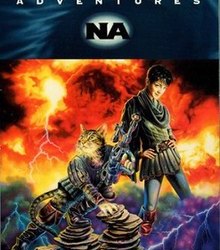
Part of what makes Bernice Summerfield such a long running success is that her series can function as a standalone thing rather than just a spin-off.
When Virgin Publishing lost the rights to Doctor Who back in 1996, they dug Benny (a character they had created for the New Adventures novels) out of the closet and designed a new series around her with no ties to Doctor Who what so ever.
That's not to say that they erased the character's past, she's still a companion and technically the series still takes place in the world of Who, but no mentions of the Doctor nor any other BBC owned character appear or are even named dropped.
So basically you can pick up this first novel, like I did, without ever having touched any of the NAs, or even without having seen an episode of Who in your life.
Because, besides Benny herself, the only other thing that can be associated with Who is Menlove Stokes from that Fourth Doctor book we covered, The Romance of Crime. And there's no references to that story here either.
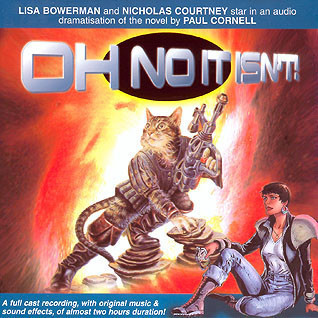
But what about the actual book? Is it any good?
Ehhhh....
I want to like it. I really do.
I love the premise. Getting caught in a augmented reality based off fairy tales!? Yes please!
Also most the characters are likable enough, even with such a large cast.
But there's one thing that really drags the whole book down.
It's the subplot between Benny and one of her students.
Through out the story Benny keeps debating about whether or not she should pursue a romance with one of the college kids that she teaches... and it's just gross.
Granted, she never goes through with it, and the narrative repeatedly points out why it's toxic, but like... why the fuck would introduce your main hero with a such a subplot anyways?
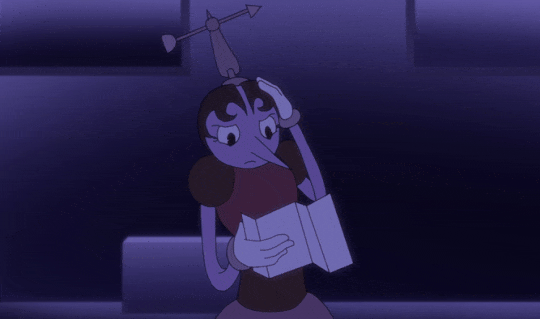
I mean if you're going to tell such a story then actually tell it. Make it the focus and draw some real drama from it. Don't shove it into the background of a completely different narrative after introducing it.
The end result is just uncomfortable and distracting. The darker subject matter clashes horribly with the surreal comedy romp that the rest if the story wants to be, and so it never feels fully resolved.
In addition it winds up undoing any hard work the book made to present it's hero as relatable and likable.
I mean, my gosh, plenty of women get a divorce without turning into pedos... seriously what the fuck?
Yeah, yeah, yeah... I know the character is in college and would technically be considered 'legal', but he's still described as a teenager several times through out the book and she's in her mid to late 30s.
Also.. She's His Damn Teacher!
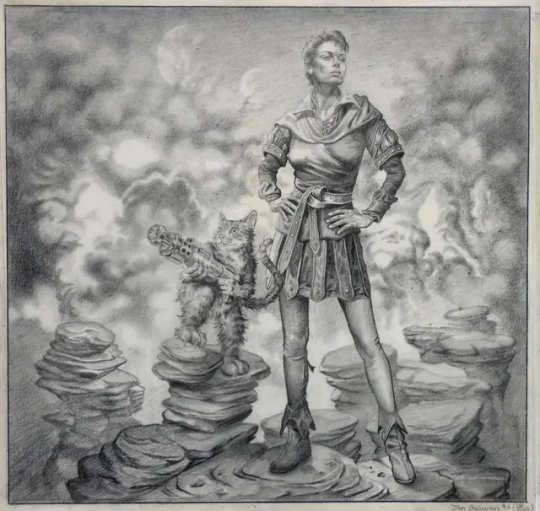
However, whenever this unpleasantness is shoved aside for the actual story, it's pretty dang good.
It's charming, funny, and fun!
Even if you're not familiar with British Panto you can still follow along with the tropes easily enough as they're mostly still rooted in fairy tales and musical theater.
It's certainly more digestible then most Virgin fare, I'll give it that, but it's still not enough to make me a Benny fan, sorry.
8 notes
·
View notes
Text
Doctor Who: The Star Beast- A Reasonably Watchable Mess
You may have noticed that, despite desperately positive, brittle reviews in the mainstream media, the last few years of Doctor Who went down like a lead balloon with actual fans and ordinary viewers. Turns out that a patronising gender-flip that served no plot purpose followed by a series of episodes in which the Doctor shilled for Space Amazon, murdered innocent giant spiders and delivered completely unearned straight-to-camera speeches like a fucking after-school special weren’t popular moves. The show’s viewing figures plummetted (despite contrary claims from the BBC that turned out, very simply, to be lies) and its review score aggregate on Rotten Tomatoes plunged, at one point, to literally 0%. Hilariously, the review aggregate from the mainstream media was around 90% at the time, once again demonstrating that the average critic can be bought for less than I spend assuring the silence of my past victims (the joke is that all my past victims are dead and I don’t spend a fucking thing on their silence). The abject failure of the Whitaker/Chibnall era was inevitable and any normal person could have predicted it. The BBC, however, didn’t and had a bit of a panic when they realised just how fucked their ratings were. Not that they admitted that, of course, but the fact they brought back the dream-team of showrunner Russell ‘The’ Davies and David Tennant for the 60th Anniversary Specials instead of letting the current incumbents stick around until after the anniversary kinda speaks volumes. So, now we’re getting three Anniversary specials, starring Tennant and helmed by Davies. The first one’s out, and it falls on me to review it as fairly as possible. So… how is it?
Well, put it this way: it’s not terrible, but it’s not the confident, unapologetic return to form I was hoping for either. It concerns a minor villain from the old DW comics called Beep the Meep who poses as a cute, furry critter while secretly plotting the genocide of the entire universe, a reunion with Catherine Tate’s always-delightful Donna Noble and a resolution to the Human/Time Lord meta-crisis that nearly straight-up killed her last time she was on-screen. And, in fairness, the stuff that works works pretty well. The jokes are funny, Tennant and Tate are excellent in their respective roles, the Meep is gloriously fucking psychotic (though the voice actor does sound like they’re phoning it in a bit) and Yasmin Finney, playing Donna’s trans daughter, is a lot less insufferable than she would have been if Chibnall had written her lines. I actually thought the bit where Donna threatens to “descend” on some kids who dead-name her in the street was well-handled and pretty accurately captured the protective instincts of a parent with a trans daughter. Mainly, she’s just there for the representation, though, and does the square root of bugger all to advance the plot. That’s probably a mercy, since I suspect the show would have had a hard time disguising the fact that this fifteen year old kid is being played by a twenty year old woman (who seems to have borrowed David Bowie’s cheekbones) if her part was any more prominent. But yeah- it’s a fun, knockabout adventure that doesn’t overstay its welcome and doesn’t try to outdo the entire show up to that point just because its been a completely arbitrary 60 years since the first episode. It’s basically fun and basically fine. It’s destined to be lauded to ludicrous excess by a mainstream media who are terrified of offering a proper critique because it’s got a trans person in it, while simultaneously being shat upon by online reviewers who know they can win easy points with the fans by challenging the suffocating ubiquity of the Standard Approved Opinion. In truth, though, it’s neither great nor awful- it’s just an hour of television that’s worth watching once but only once. It contains some good stuff… and some shite stuff.
Ah yes, the shite. That’s what you came to read about, isn’t it? Nobody in their right mind shows up at my blog-step for kind words and understanding: you come here because you know I have the pithiest insults and pissiest hot-takes. And yes: there’s some real fucking garbage to dunk on here. First of all, the Human/Time Lord meta-crisis gets resolved in the dumbest fucking way possible. For those of you who don’t remember, the ending of Modern Season 4 of DW was one of the most heartbreaking things ever attempted in a show designed for family viewing. Donna took on the consciousness of a Time Lord in order to save the universe but nearly burnt out her synapses in the processes. The Doctor wiped her mind to save her life, and then had to leave, because if she ever remembered him or the adventures they’d shared together, the crisis would reassert itself and her brain would overload, killing her. And the way they get around this, initially, is alright. Because Donna had a child, part of the meta-crisis got passed onto her, allowing two minds to take a strain that would kill just one. It’s a sweet and perfectly acceptable way of sorting a complex problem and something that legitimately wouldn’t have occurred to the Doctor at the time, because he had to come up with a solution that would work in the moment, not something that would require a nine month gestation period. But then, for some stupid fucking reason, they took it one step further and had Donna and her daughter simply relinquish the power of the meta-crisis, handwaving the obvious bullshit-ness of this move by claiming it just wouldn’t have occurred to a male-presenting Time Lord. The Doctor’s not an idiot. If that was an option, it would have occurred to him. Fuck, it did occur to him that one time Rose Tyler absorbed the Time Vortex and he had her give it up, channelling it into him to save her life at the cost of forcing a regeneration. It’s simultaneously contrived and slap-dash- a hasty right-on girl-power moment that fails miserably to play by the rules and cheapens the original story of the meta-crisis retroactively. It also brings us, neatly, to the phrase ‘male-presenting Time Lord’.
There’s a line in the excellent It’s Always Sunny in Philadelphia wherein Charlie describes himself as “a straight man who poops transgender”. The phrase ‘male-presenting Time Lord’ sounds weirdly similar to me. It’s too specific and technical, while also including a wildly silly element (‘Time Lord’ is a vaguely ethereal, grandiose title that doesn’t gel with earthly, human discussions of gender identity). People just don’t talk like that. Sometimes people write like that, seeking an economy of phrasing that looks good on the page… but nobody actually talks like that. I mean, the context in which it’s used is stupid, but the phrasing itself is stupider. It’s also emblematic of a problem with the script as a whole. It feels like a first draught.
What do I mean by that? Well, there’s just a lot of instances where conversations feel slightly stilted or opportunities are missed. Case in point, there’s a bit where Donna’s discussing her kid growing up with her own mum, and it feels like it was meant to be a poignant discussion of the trials and tribulations of raising a child and then realising that they’re not what you were expecting but their own, completely separate person. What we get is just a placeholder where a couple of jokes occur but nothing of import is really said. Similarly, there’s a line where the Doctor muses that he doesn’t know who he is any more, which feels like it was meant to be developed into a meditation on his sense of identity after so many regenerations, metatextually addressing the show’s loss of a coherent, inter-regenerational identity for its lead character. Absolutely fucking nothing comes of it. There’s even a bit where a UNIT scientific advisor in a wheelchair encounters a flight of stairs and the way it’s shot makes it feel like there should have been a joke there. Maybe there could have been a really slow lift that she has to use while her soldiers rush up the stairs, or maybe she could have made one of them carry her. I’d have taken a lazy, low-hanging quip like “stairs…. My old nemesis” to be honest. But all we get is “sorry about the stairs,” and that’s it. My point is that there’s a superficiality to a lot of the scenes and lines that yells ‘PLACEHOLDER’, and areas that desperately need polish.
Speaking of polish: London is once again too fucking clean. I wish TV shows would stop doing that- making London look like the MCU’s version of fucking New York- all glass skyscrapers and clean streets. The real London is a bizarre, dystopian mix of impersonal steel monuments to capital, crumbling baroque architecture from the middling-glorious past and slumping, poverty-stricken housing from a fucking Dickens novel. The city has a really specific, slightly nightmarish character that most telly shows and films fail miserably to capture. It’s inexcusable in this case, because Doctor Who actually used to do a pretty good job of showing London as it is. Which is mental, since it used to be filmed in Swansea in cocking Wales.
But I digress. My final major issue is that the message of the show’s text is wildly at odds with the metatextual message of the specials’ mere existence. The whole reason the BBC re-hired Tennant and Davies onto the show was to announce a return of the Who everyone loved; a tacit admission than the last few years of lazy virtue-signalling and shoddy script-work had been a mistake that they were keen to move on from. There is literally no other reason to take such an obvious backward step in the show’s development. Yet the episode The Star Beast keeps bringing up Whitaker’s tenure as the Doctor as though it’s something to be celebrated. We get lines like “The Doctor’s a man and a woman. And both. And neither. And more,” (again, nobody fucking talks like that) that feel like an attempt to fold the previous three years into the acceptable canon, when the whole reason the specials are happening is to renounce them and leave them in the cold. Then again, that’s the Beeb for you- it's amazing if the left hand knows what the left hand's doing. If someone's bothered to inform the right hand, it's so surprising as to be frankly suspicious. Add to that the extra layer of complexity that comes from getting Disney to part-fund the show and you’re bound to end up with a confused mess. Also, why did they bother getting Disney to part-fund this? The Special Effects look like something a fourteen year-old could whip up in his bedroom. Which is fine- I never mind the sets wobbling in Who: I just can’t figure out where all the fucking money went.
I think the root problem is two-fold. First, as much as I loved Russell T. Davies’ original time as showrunner, it’s really obvious he’s gotten old. It’s only been fifteen years since his time in charge ended, but sometimes, the ageing process kicks a guy’s arse really suddenly (ask me about waking up one day to discover I now have man-boobs sometime). There’s this interview he did recently about how Davros represents an offensive portrayal of wheelchair users, and it’s clearly just the ramblings of a confused old man. Nobody looks at Davros, creator of the Daleks, and thinks ‘yup- there goes a typical wheelchair user’. Part of the point of his character is that he’s kind of admirable on paper, overcoming age and sickness to achieve the impossible… but he perverts and subverts those expectations by doing something fucking appalling. It’s a nuanced, complex take on the way pain and suffering can make a person sympathetic without necessarily redeeming them. And Russel T. Davies, a once-talented writer who should understand this stuff, just doesn’t get it any more. He’s well-meaning, but he’s clearly just not up to the job any more. I mean, he still has talent- his renewed tenure will be better than Chibnall’s… but maybe it would have been a better idea to let the poor schmuck retire on a high note.
The other problem is deeper and more intractable. The world has changed since Doctor Who was the best thing on television, and it might be that it just can’t work any more. The modern era of Who was born from a place of hope yet, also, a place of marginalisation. It was 2005. The government of the day had dome some pretty fucked up things, but they were nowhere near as evil as the governments who were to succeed them. Sci-fi was still a niche thing allowing for experimentation and weirdness. There were definite good guys and bad guys on the world stage and in domestic politics: there were genuine victims on one side and hateful bigots on the other, and it seemed like it might actually be possible for the underdogs to win for a change. 2023 is a different world. We’ve seen the worst UK governments since Thatcher in the 80s (and people kept voting for them) and the worst US President in history (a Savaloy-orange freak with the hair of a sexually-confused Nazi). On the cultural level, the lines between victims and villains have blurred, with the arrival of the never-ending Oppression Olympics birthing a generation of dead-eyed bullies who hide behind nominal ‘oppressed’ status in order to tear down genuinely nice people (like that time a load of wankers piled onto a scientist who landed a probe on a moving comet FOR THE FIRST TIME IN HUMAN HISTORY because he did while wearing a T-shirt with a stylised naked lady on it). Identity has replaced solidarity as the go-to discussion in progressive (or allegedly progressive) circles. The sci-fi genre itself has become popular- meaning it’s infested with normies who don’t understand it but do want to own it. Doctor Who was never built for this world. The change in culture and society over the last just-under-twenty years is more significant, in some ways, than the changes that occurred between its original outing in the 60s and its reboot in 2005, and I don’t know if it can survive those changes. We inhabit a world where actual heroism and even basic decency seem less important than the performance of those qualities in ways that a mass audience can understand and where nuanced solutions, informed by kindness, are verboten because everyone’s supposed to pick a side. There’s no room for a genteel, British/Alien gadabout with two hearts and a silly sonic screwdriver in a world where the battle-lines are drawn and performative virtue has become a universal aspiration. In order to fit our tawdry world, Doctor Who would have to stop being Doctor Who. And, to be blunt, our culture doesn’t really deserve any form of Doctor Who at the moment.
So yes, The Star Beast is pretty good. It’s a nice slice of television that fails on many fronts, but still manages to entertain. But what next? Where can we possibly go from here? Personally, I intend to watch the specials and- if they’re okay- Ncuti Gatwa’s era after that. Then I think I’m done. By rights, the show should face cancellation while it’s still strong enough to bow out gracefully, but if that doesn’t happen, I’ll still have to pick a point to stop watching. Sooner or later, all good things must come to an end, and if the BBC isn’t big enough to admit that, at least I am. I suggest you pick somewhere to draw a line, too.
7 notes
·
View notes
Text

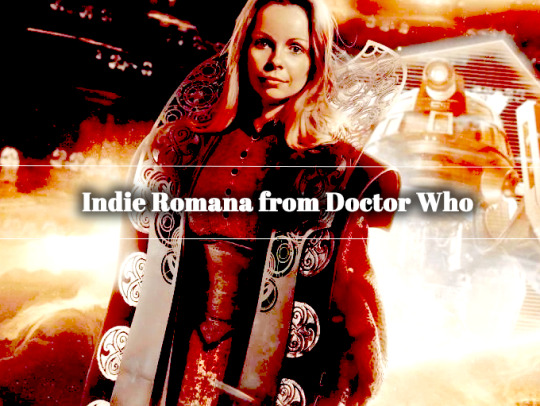
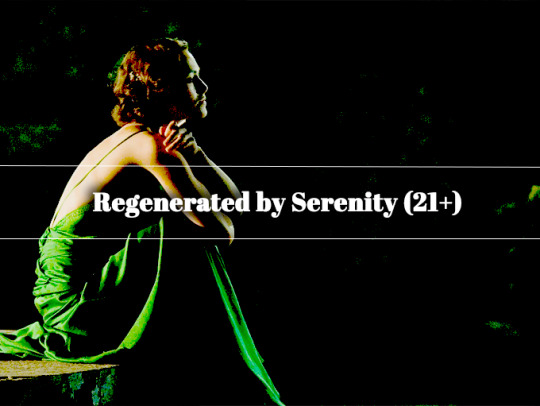
"𝘛𝘩𝘦 𝘕𝘰𝘣𝘭𝘦𝘴𝘵 𝘙𝘰𝘮𝘢𝘯𝘢 𝘰𝘧 𝘵𝘩𝘦𝘮 𝘢𝘭𝘭!"
Independent Headcanon based roleplay blog of 𝐑𝐎𝐌𝐀𝐍𝐀 from 𝘋𝘖𝘊𝘛𝘖𝘙 𝘞𝘏𝘖. Written by Serenity (21+) with influences from Classic Doctor Who, Modern Doctor Who, and Extended Universe Content; Gallifrey Big Finish Audios, Virgin New Adventures, Virgin Missing Adventures, BBC Eighth Doctor Adventures, BBC Past Doctor’s Adventures, & any other Big Finish Audiobooks. Low & Sporadic Activity. Anti Timeless-Child.
[ DOSSIER ] [ PINNED POST + RULES ]
#promo ;; we are stars#dw rp#doctor who rp#romana rp#romanadvoratrelundar rp#indie dw rp#indie doctor who rp#time travel rp#doctor who roleplay
4 notes
·
View notes